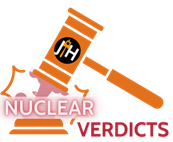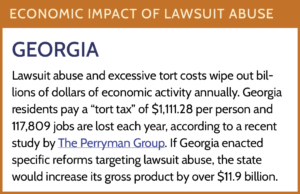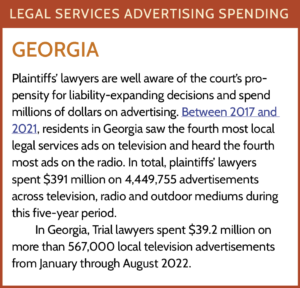NUCLEAR VERDICTS

Georgia has been one of the most prolific producers of nuclear verdicts nationwide. Nuclear verdicts are awards that exceed $10 million.
From 2010 to 2019, 53 nuclear verdicts in personal injury and wrongful death cases were reported in Georgia totaling more than $3 billion. According to a recent study published by the U.S. Chamber of Commerce Institute for Legal Reform, “During the final two years of the ten-year period, these verdicts propelled Georgia into the top five states for nuclear verdicts.” The recent dramatic rise in nuclear verdicts can be attributed to several factors, including the state’s allowance of “anchoring” tactics by plaintiffs’ lawyers. Anchoring is a tactic that lawyers use in order to place an extremely high amount into jurors’ minds to start as a base dollar amount for a pain and suffering award. While some states have laws that prevent or limit this tactic’s use in a courtroom, Georgia is one of a few that has a specific state statute allowing the practice.
Premises liability cases have generated some of the most absurd nuclear verdicts in Georgia, particularly lawsuits blaming businesses for the criminal conduct of others on or near its property. Additionally, the trucking industry has been a primary target of runaway verdicts, as has been well chronicled by recent Judicial Hellholes® reports.
The nuclear verdicts against the trucking industry not only affect the companies named in those law- suits, but the industry itself. According to a study by the American Transportation Research Institute (ATRI), the average auto liability premium has increased significantly for fleets of all sizes. With the average size of verdicts in excess of $1 million increasing from $2,305,736 to $22,288,000 nationwide between 2010 and 2018, insurance companies are charging more to cover these excessive litigation risks. These rising insurance premiums often hit small businesses the hardest and have driven many out of business.
Notorious Plaintiffs’ Firm Responsible For Several Nuclear Verdicts In State
James Butler Jr., the founding partner of Butler Prather LLP, formerly of Butler Wooten Cheely & Peak, a well-known plaintiffs’ lawyer in the state of Georgia who has secured multiple nuclear verdicts of $100 million or more.
Butler contributes thousands of dollars each year to judicial campaigns across the state. Between 2016 and 2022, he donated thousands of dollars directly to campaigns for appellate and supreme court justices.
In addition, his law firm is listed as a supporter of Gwinnett County State Court Judge Shawn Bratton, the judge who oversaw Butler’s case against Ford this year that resulted in the eye-popping $1.7 billion verdict discussed below.
Record Punitive Damage Award Handed Down in Gwinnett County
In August 2022, a Georgia jury returned a $1.7 billion punitive damage verdict against Ford, finding that the company sold millions of “Super Duty” models with defectively weak roofs. As mentioned above, the plaintiffs were represented by James Butler, Jr., a financial supporter of the judge overseeing the case.
Butler and his team are requesting anywhere from $549 million to $686 million in attorneys’ fees plus an additional $500,000 in litigation costs on the basis that the automaker rejected the plaintiffs’ $50 million settlement offer and opted to defend itself at trial.
This is the highest punitive award to be issued in Georgia’s history and is an almost fourfold increase on the previous state record for punitive damages of $457 million.
Butler initially brought the case in Cobb County Circuit Court. Disappointed by the way things were going, he voluntarily dismissed the case and refiled it in Gwinnett County before a friendly judge. Gwinnett County Judge Shawn Bratton was a plaintiffs’ lawyer prior to being appointed to the bench in 2014 and has deep ties with the Georgia plaintiffs’ bar. While federal courts and some states have a pre-dismissal rule to prohibit voluntary dismissals like these, Georgia has not adopted such a rule.
The ethically questionable events and severely biased court orders leading up to the massive verdict epitomize what we have come to expect in Judicial Hellholes®. In July 2015, about fifteen months after the accident, the plaintiffs’ lawyers secretly exhumed the bodies of the decedents and hired the Chief medical examiner for the Georgia Bureau of Investigation, Jonathan Einstat, to conduct an “unofficial” and “private” autopsy at an undisclosed location. No other autopsy had been conducted and first responders listed their causes of death as “multiple traumas.”
Ford was never given notice of the plaintiffs’ intention to exhume the bodies until they received the plaintiffs’ autopsy report. By then, the bodies were reburied before Ford could conduct their own counter- autopsy. Neither the plaintiffs’ lawyers nor the medical examiner properly documented the autopsy and the examiner only took selective photos based on “the feel” of the autopsy. Upon completing his examination, the medical examiner dismembered the body in a way that future testing could not be conducted. (2018.04.06 – Hill – FMC’s Motion for Sanctions – Spoliation)
During trial, the court granted the plaintiffs’ motion in limine (a pre-trial request to exclude evidence) to prevent Ford from making any insinuations about the autopsy process. The court prohibited Ford from questioning the credibility of the autopsy, suggesting in any way that the autopsy was conducted in secret, or stating that they were excluded from the autopsy. Without proper documentation, Ford argued that the exhumation procedure had a prejudicial effect on its ability to prove causation.
Additionally, Ford was prohibited from informing the jury that the plaintiffs were improperly wearing their seatbelts during the crash.
In total, Judge Bratton granted 25 of the plaintiffs’ lawyers 31 motions in limine, while only denying 3 (the others were either limited, deferred or withdrawn). On the other hand, Judge Bratton only granted 8 of Ford’s 32 motions in limine.
On the 15th day of the trial, Butler moved for a mistrial. He objected to a question by one of Ford’s lawyers during expert testimony, expressing to the judge he was concerned about where the lawyers were going with their line of questioning. Following a brief recess, Judge Bratton ordered a mistrial on the basis that Ford violated 3 motions in limine excluding certain evidence and arguments.
Once the mistrial was declared, the plaintiffs filed a post-mistrial motion for sanctions against Ford. The court obliged and issued the most extreme “death penalty” sanctions.
As part of these sanctions, on retrial, the jury was instructed to assume six things from the outset:
- The roof on the subject 1999-2016 Super Duty trucks was and is defectively designed and dangerously weak;
- The roof on the subject 1999-2016 Super Duty trucks was and is susceptible to collapse or crush in a foreseeable rollover wreck which can cause death or serious injury to occupants of the trucks;
- The acts and failures to act by Ford Motor Company in selling trucks with that weak roof amount to a willful, and a reckless, and a wanton disregard for life;
- Ford Motor Company knew of the dangers posed by the roofs in the subject trucks and therefore had a duty to warn members of the public of that danger, but willfully failed to so warn the public;
- The defect in the roof of the Hills’ truck resulted in roof crush that caused the injuries that led to the deaths of both and Mrs. Hill; and
- The rollover wreck in this case was foreseeable.
Judge Joseph Iannazzone oversaw the retrial. He instructed the jury to presume the facts from the sanctions order to be true. He advised them that their sole responsibility was to determine the amount of compensatory damages and whether there was “clear and convincing evidence” that punitive damage should be imposed against Ford. (2022.08.04 Transcript Sanctions findings at trial)
In August 2022, the trial concluded, and the jury awarded plaintiffs $24 million in compensatory dam- ages, including $8 million for pain and suffering. The jury also awarded $1.7 billion in punitive damages. Following the verdict, the jury confirmed that once the court issued the sanctions order, it wasn’t a matter of whether to award punitive damages, it was a matter of how much.
Ford immediately filed a motion for a new trial and a motion to remit hoping the new senior judge now overseeing the case will lower the $1.7 billion verdict considerably to align with U.S. Supreme Court guidelines.
While legitimate ethical questions exist in this case, it also highlights how the state of Georgia’s cur- rent legal climate can be frequently manipulated by cunning personal injury lawyers to create fundamental unfairness for Georgia defendants.
Other Recent Examples of Nuclear Verdicts in Georgia
The 2021 Judicial Hellholes report highlighted a $200 million award in Rabun County in Baetchelder v. Malibu Boats LLC, the county’s largest ever verdict to date. Malibu Boats LLC was held liable for failing to provide any warnings or guidance to users of a boat that its design was susceptible to bow swamping if weight was being carried in the bow seat. The verdict included $80 million in pain and suffering plus $120 million in punitive damages to the parents of a boy who died in a boating accident.
In 2022, Malibu Boats LLC requested the court disregard the verdict or order a new trial because there was insufficient evidence to hold it liable for failing to warn and the punitive damage amount violated the
U.S. Constitution as “excessive and arbitrary punishment.” However, Judge B. Chan Caudell denied this request in an 80-page order and upheld the $120 million in punitive damages.
Other examples of recent nuclear verdicts include:
- December 2021: $113.5 million verdict (including $100 million in punitive damage) in a wrongful death case in S. District Court for the Northern District of Georgia
- September 2022: $77 million verdict (including $10 million for pain and suffering, $55 million for value of life, and $1 million in punitive damages) in a wrongful death case in DeKalb County Superior Court
- October 2022: $75 million verdict (including $9 million for past medical damages, $20 million for future medical expenses and $46 million for pain and suffering) in a medical liability case in Fulton County Superior Court
KEY CASE TO WATCH
 A key case to watch that could impact Georgia’s nuclear verdicts is Taylor v. Devereux Foundation, a challenge to the state’s statutory limit on punitive damages. A Cobb County jury ordered a health clinic to pay a former patient $7.6 million over allegations that it failed to prevent sexual abuse in the facility, plus $50 million in punitive damages. After the trial court reduced the punitive damages portion of the award to $250,000 to reflect the maximum permitted by state law in a non-product liability case unless a defendant acted with specific intent to cause harm, the plaintiff’s attorney challenged the constitutionality of the cap in an appeal to the Georgia Supreme Court.
A key case to watch that could impact Georgia’s nuclear verdicts is Taylor v. Devereux Foundation, a challenge to the state’s statutory limit on punitive damages. A Cobb County jury ordered a health clinic to pay a former patient $7.6 million over allegations that it failed to prevent sexual abuse in the facility, plus $50 million in punitive damages. After the trial court reduced the punitive damages portion of the award to $250,000 to reflect the maximum permitted by state law in a non-product liability case unless a defendant acted with specific intent to cause harm, the plaintiff’s attorney challenged the constitutionality of the cap in an appeal to the Georgia Supreme Court.
The limit has been in place since mid-1980s and has twice been upheld by the Georgia Supreme Court. As ATRA highlighted in its brief, a statutory limit on punitive damages does not intrude upon the fact-finding authority of the jury, and it is rather a public policy determination to avoid excessive awards that is best resolved by the General Assembly. The Georgia Supreme Court is expected to decide the case in 2023.
 A new #1 Judicial Hellhole® burst onto the scene in 2022. The litigation climate in Georgia has deteriorated for years and in 2022 it reached fever pitch. Georgia replaced California on the top of this year’s list thanks in no small part to a massive $1.7 billion nuclear verdict that can charitably be called concerning. Georgia state courts issue some of the country’s largest nuclear verdicts in state and superior courts, as personal injury lawyers cash in on plaintiff-friendly judges that benefit greatly from trial lawyer campaign contributions.
A new #1 Judicial Hellhole® burst onto the scene in 2022. The litigation climate in Georgia has deteriorated for years and in 2022 it reached fever pitch. Georgia replaced California on the top of this year’s list thanks in no small part to a massive $1.7 billion nuclear verdict that can charitably be called concerning. Georgia state courts issue some of the country’s largest nuclear verdicts in state and superior courts, as personal injury lawyers cash in on plaintiff-friendly judges that benefit greatly from trial lawyer campaign contributions.





 A key case to watch that could impact Georgia’s nuclear verdicts is
A key case to watch that could impact Georgia’s nuclear verdicts is  Companies that provide loans to plaintiffs in personal injury suits in exchange for a percentage of their awards are permitted to charge extremely high interest rates despite Georgia’s usury law. Unfortunately, the legislature has not acted to address these practices, which take advantage of vulnerable consumers and complicate the ability of parties to resolve litigation.
Companies that provide loans to plaintiffs in personal injury suits in exchange for a percentage of their awards are permitted to charge extremely high interest rates despite Georgia’s usury law. Unfortunately, the legislature has not acted to address these practices, which take advantage of vulnerable consumers and complicate the ability of parties to resolve litigation.

